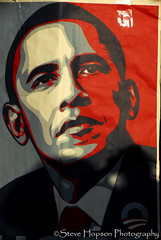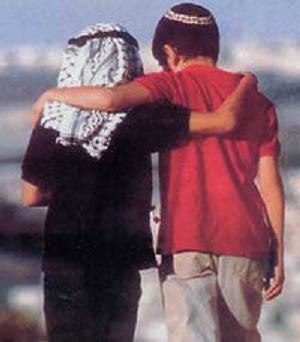A Palestinian: You claim this land is your land because the Bible says so. Is that the basis on which my family, which owned land here long before the Jews took over in 1948 should be kicked off our land or allowed to live here only under occupation, disproportionate attacks, blockades, and military checkpoints? An Israeli: Israel's small minority of religious people use the Bible to claim that Israel is the Jews' land, just as the Koran's prescriptions govern Islamic behavior. But beyond that small minority of Israelis, most Jews are secular and believe Israel should be theirs because of their extraordinary need for a safe homeland: For two thousand years, the Jews have been the target of extraordinary persecution: from their destruction by the Romans to the Inquisition to the Pogroms, and of course, the Holocaust. Indeed, it was in recognition of the Jews' need for a homeland that motivated the United Nations to give the Jews that tiny sliver of desert land.
A Palestinian: But that didn't give you the right to treat us as second-class citizens and then, when you developed a military, to be so aggressive to us. Look--in 1967, Israel invaded Gaza, the West Bank, and the Golan Heights and took it over--those were not part of the land the UN gave you.
An Israeli: Remember, in 1967, Egypt's, Jordan's, and Syria's military mounted a massive force at the Israeli border and there were calls to wipe Israel off the face of the earth, complete destruction. Would you have done nothing? So, Israel responded.
A Palestinian: But you didn't just preempt and attack. You took over our land: Gaza, the West Bank, the Golan Heights.
An Israeli: If you were a tiny country surrounded by enemies sworn to your destruction, and in the war to defeat them you took small bits of land that would provide a buffer against future attacks, isn't that fair?
A Palestinian: No. First of all, you didn't just take buffer land. You took more. And you then treat the residents like second-class citizens.
An Israeli: As you know, all Israelis, Arab and Jew alike all have equal rights: to education, to vote and so on.
A Palestinian: That's not fair. You know there are countless ways in which Israeli Jews treat Israeli Arabs and Palestinians like second-class citizens.
An Israeli: If, de facto we treat Arabs less well, it is because while we Israelis have built a modern democracy--with equal rights for women, a tremendous prioritization of education, creating world-class scientists who can cure diseases, many of the Arab and Palestinian people are more interested in keeping things pretty much like they were in the 7th century.
A Palestinian: That's both an unfair generalization and very judgmental of you--Who is to say whether your version of society is a better way of life? Look at all your immoral behavior, your shallow materialism? What are you so proud of--that you brought Dunkin' Donuts and Burger King to Israel?
An Israeli: Dunkin' Donuts and Burger King are not core to the difference between the Israeli vision and the Arab/Palestinian vision. Yes, Israel believes that its vision is better, yes better, for humanity. And because we disagree about that, that's why we, like you, believe the only answer is a two-state solution--two separate countries with two separate sets of values.
A Palestinian: I do not believe that, long-term, such different people can live side-by-side in peace.
An Israeli: Candidly, I agree with you, especially because the surrounding countries are all Arab, with such long-standing antipathy toward Israel and the Jews, especially the powerful radical elements: Hezbollah, Islamic Jihad, Al-Qaeda, and of course Hamas, the terrorists your people elected, all of which call for the destruction of Israel, wiping it off the face of the earth.
A Palestinian: If you got out of the West Bank, the Golan Heights, and East Jerusalem, and gave the displaced Palestinians and their descendants the right of return, then I think even the radical elements would agree to peace.
An Israeli: I strongly doubt it. Remember, in 2000, President Clinton brokered a deal in which Israel offered the Palestinians virtually everything they asked for, yet Arafat, the Palestinian leader, walked away. In 2005, Israel left Gaza; every single Jew left, as an olive branch. What is Israel getting as a thank-you present? Rockets, an ever increasing number of rockets--more than 8,000. The entire Israeli town of Sderot has been obliterated. And now, Iran is giving you longer-range missiles that are hitting our big cities of Ashkelon and Beersheba.
A Palestinian: But look what you did--so disproportionate. You have destroyed Gaza, killing so many more innocent Palestinians with your attacks.
An Israeli: When you deliberately embed your terrorists and rocket-launching installations in residential neighborhoods to deter Israel from attacking them--that's a war crime--what do you expect? Is it disproportionate for Israel to do everything possible to protect the million Israelis currently under threat of attack, and countless more with Iran putting finishing touches on a nuclear weapon and Iran's president Ahmenijad, like Hamas, committed to destroying Israel?
A Palestinian: You're right. Israel and Palestine cannot exist side by side.
An Israeli: So, if they can't, either Israel or Palestine must be moved somewhere else.
A Palestinian: Right. Because the surrounding peoples are less likely to attack Palestinians than to attack Jews, I'd argue that it's Israel that needs to be moved.
An Israeli: As you know, some of the most passionate Jews in the Palestinian/Israeli dispute claim Israel is the Jews' birthright because it says so in the Bible.
A Palestinian: There are trade-offs in any agreement. For the Jews to have a homeland where they can, long-term, live in peace without a massive military, they will have to move elsewhere. Remember, our Koran does, in many places, specifically call for the killing of the Jews. And our people contain many fundamentalists, likely to deeply believe in the Koran's orders.
An Israeli: A good point, my friend. Well then, the place where Jews are most likely to be accepted would be near a major Jewish population center in a Western democracy, for example, an Israel-sized sliver of the massive amount of low-cost undeveloped land an hour or two north of New York City.
A Palestinian: That could be New Israel. But how could the U.S. be convinced to donate it?
An Israeli: With the amount of money that the U.S. gives to Israel and the amount of money that Islamic countries and militant groups and other international groups give to support the Palestinians, there would be plenty of money to offer relocation assistance to Jews wishing to move to New Israel who couldn't afford to do so. But there are two million Jews in Israel. Many of them won't want to go to New Israel.
A Palestinian: They, of course, could stay, but they'd be living in a Palestinian state.
An Israeli: So all of Israel, Gaza, the West Bank, the Golan Heights would go to the Palestinians. It would all be a Palestinian state?
A Palestinian: Yes.
An Israeli: Well, at least that way, the Palestinians would have the homeland they've long longed for, surrounded by their Arab brethren and with their Israeli enemy 6,000 miles away. And the Israelis would have a safe homeland next to millions of other Jews in the United States, with their enemies 6,000 miles away.
A Palestinian: And after the establishment of New Israel, all the money that currently goes to the military and rebuilding after the Israeli and Palestinian attacks, could go toward things more likely to benefit humanity.
An Israeli: So perhaps it wouldn't just be a pipedream that Israeli and Palestinian children could enjoy their childhood and aspire not to be soldiers or terrorists but doctors, teachers, and artists.
A Palestinian: It is time to replace jihad with jobs.
An Israeli: Hate with hope.
A Palestinian: And maybe even with love.























